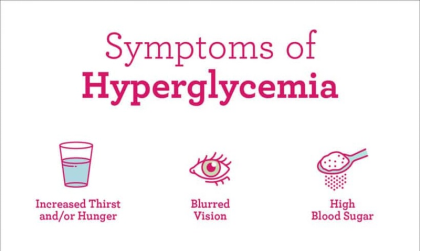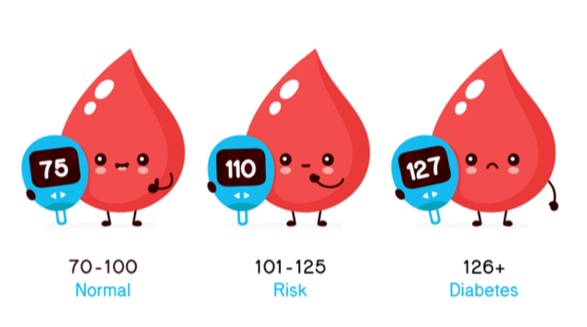Managing blood sugar levels constitutes a pivotal feature of general health. This importance magnifies significantly for individuals grappling with diabetes. To avert complications and secure an enhanced life, understanding the indicators of uncontrolled blood sugar is paramount. This article will explore symptoms associated with high blood sugar meticulously to support early detection.
Common Indicators of High Blood Sugar
An imbalance in glucose levels can manifest as various symptoms, signifying high blood sugar or hyperglycemia. It is crucial to promptly intervene by recognizing these indicators.
Increased Thirst and Urination:
An increase in thirst and frequent urination commonly indicate elevated blood sugar. The kidneys function more intensely to eliminate excess glucose. This is a process that can lead to dehydration and a heightened need for fluids.
Fatigue and Weakness:
Feelings of fatigue and weakness may result from uncontrolled blood sugar levels. Overall vitality also experiences an impact due to the body's inefficiency in converting glucose into energy.
Blurred Vision:
Elevated blood sugar can impair vision, inducing blurred images. Promptly addressing this symptom is crucial to avert enduring damage to your sight.
Additional Symptoms of High Blood Sugar
Frequent Infections:
Uncontrolled diabetes can elevate an individual's susceptibility to infections. Elevated blood sugar levels weaken the immune system. Consequently, effectively combating infections becomes more challenging for the body. This highlights the impact of uncontrolled diabetes on overall health and well-being.
Slow Wound Healing:
Elevated levels of blood sugar can impede the body's efficient wound-healing capabilities. A delay in wound healing often occurs as a common complication, and individuals suffering from diabetes might experience injuries requiring more time to mend.
Nausea and Vomiting:
Elevated blood sugar levels can, in some cases, induce nausea and in severe instances, provoke vomiting. An overall sense of discomfort might accompany these symptoms.
Unexplained Weight Loss:
Despite regular eating habits, uncontrolled diabetes may induce unintentional weight loss. The body might initiate a process of breaking down muscle and fat for energy which is an effect of its ineffective use of glucose.
Difficulty Concentrating:
Cognitive function can undergo alterations due to changes in blood sugar levels. Those with elevated blood sugar may encounter challenges in concentration, memory problems, or perceive a mental fog.
Skin Issues:
Elevated blood sugar levels may cause skin problems like dryness, itching, or infections. Conditions related to diabetes can appear as dark patches known as acanthosis nigricans, or they may present other dermatological concerns.

Increased Hunger:
Uncontrolled blood sugar, though it may appear counterintuitive, can precipitate heightened hunger. The body's cells lack essential energy; a signal that prompts an apparent requirement for additional sustenance.
Mood Swings:
Mood stability can be impacted by fluctuations in blood sugar. High blood sugar levels might induce irritability, mood swings, and even an elevation of stress and anxiety.
Tingling or Numbness:
Prolonged high blood sugar can potentially complicate peripheral neuropathy, a condition that manifests as tingling or numbness in the extremities. This condition can influence and impair nerve functionality, consequently compromising sensation.
Breath Odor:
Severe, uncontrolled diabetes can manifest a breath odor that is either fruity or acetone-like. The body's breakdown of fats for energy produces this scent.
By recognizing these symptoms, one can gain a comprehensive understanding of the various manifestations high blood sugar may present.
When to Contact Your Doctor?
You must recognize the signs of out-of-control blood sugar to proactively manage diabetes. Lifestyle adjustments and self-monitoring are crucial. However, certain symptoms demand immediate communication with your healthcare provider.
If you experience any of the following signs, rather than avoiding them or downplaying their significance, it is advisable to contact your doctor for guidance and evaluation.
1. Persistent High Blood Sugar Readings:
If your blood sugar levels consistently persist outside the target range, you must consult with a healthcare provider. Such consultation allows for an assessment of your situation and recommendations aimed at better control over glucose levels are likely to be suggested by the doctor.
2. Severe Symptoms of Hyperglycemia:
Immediate medical attention is necessary in cases of severe hyperglycemia such as extreme thirst, frequent urination, persistent fatigue, and nausea characterize this condition. These symptoms potentially signal an emergency.
Therefore, seek guidance from your doctor on the subsequent actions to take.
3. Unexplained Weight Loss:
If you perceive a substantial, unexplained loss in weight despite your adherence to regular eating habits, this may signal poorly controlled blood sugar.
Start discussing with your physician for an investigation into potential underlying issues and modification of the management plan accordingly.
4. Persistent Skin Issues:
If you experience persistent dryness, itching, or infections with your skin, it may signify complications tied to diabetes. By consulting your doctor, you can identify the cause and determine an appropriate course of action.
5. Changes in Mental Function:
Fluctuations in blood sugar levels could potentially link to difficulty concentrating, memory issues, mood swings, or signs of mental fog.

6. New or Worsening Neuropathy Symptoms:
If you encounter new or intensified symptoms of peripheral neuropathy such as tingling, numbness, or pain in the extremities, contact your doctor.
7. Persistent Infections:
If you experience frequent infections, they may indicate compromised immunity associated with uncontrolled diabetes. It is within your doctor's capacity to evaluate your general health and suggest suitable interventions.
Never hesitate to contact your doctor. Keep in mind that early intervention is essential for upholding optimal blood sugar control and forestalling long-term complications.
Conclusion
Recognizing the signs of uncontrolled blood sugar is the first step on the road to managing your blood sugar and minimizing its effects. To live healthier lives, it's imperative to take specific actions. Key among these is regular communication with healthcare professionals and a proactive management approach towards diabetes, not merely reactive measures, which are vital for achieving long-term well-being.
Adopting a holistic approach, encompassing balanced dieting, routine physical activity scheduling, and adherence to medication protocols, alongside regular monitoring allows them not only to navigate the challenges presented by diabetes but also to maintain healthy blood sugar levels.






